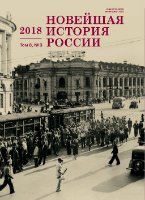«Если друзья сочтут целесообразным выдвинуть… мы поддержим»: Международные Ленинские премии мира в системе советской культурной дипломатии
“If friends Find it Advisable to Put Forward… We Will Support”: the International Lenin Peace Prizes in the System of Soviet Cultural Diplomacy
Author(s): O. S. NagornayaSubject(s): Cultural history, International relations/trade, Cultural Anthropology / Ethnology, Cold-War History
Published by: Издательство Исторического факультета СПбГУ
Keywords: transnational history; soviet cultural diplomacy; Cold war; Lenin Peace Prize; international relations; soft power; event-management;
Summary/Abstract: This article is dedicated to the study of the institutional history of the International Lenin Peace Prize Committee with the aim of reconstructing the specificity of the soviet cultural diplomacy: the formation and broadcasting of peace-making passwords and methods of influence on the international community, the receptions of the soviet symbolic messages by target groups. As the source base, the author made use of archive documents and published materials of party and state bodies, press and journalism, citizens’ letters. As the methodological foundation of the analysis emerged the approaches and methods of global and transnational history, cultural history. The largely scaled staged project of Lenin’s (Stalin’s) Peace Prizes promoted by the USSR as the alternative of the Nobel Prize, was used for the aims of positioning the idea of “the soviet-style peacemaking”, the symbolic encouragement of the loyalty to the socialist camp of the remarkable actors of the Cold war, the conflicts moderation in the satellites countries, symbolic mobilization of their own population. The period of legal registration of the Committee’s activity coincided with the crisis of the pre-war cultural diplomacy’s structures under the conditions of the necessity of the Soviet Union’s representation as the winning country. The external image and the internal discussions of the Committee were burdened by the question of self-dependence and freedom of decisions. The internal documentation gives evidence of the soviet party bodies’ using not only the means of open pressure on the Committee members, but also their manipulating the body, which included the loyal to the USSR representatives of the international community. As the indirect means of the impact served the conditions of the committee members’ admission as well as its representatives’ instruction among the soviet public figures. The laureates of the Lenin Peace Prize became important links in the USSR’s cultural diplomatic networks. Their international authority was intensely used with the aim of the foreign policy representations of the soviet position in different regions of the world for strengthening the position of the certain leader. The reception of the honours project by ordinary citizens of different countries reflected the reaction of the contradiction of the soviet peace-building discourse as well as incomprehension of fast-moving often populist and inconsistent turns of the soviet foreign policy.
Journal: Новейшая история России
- Issue Year: 8/2018
- Issue No: 24
- Page Range: 737-753
- Page Count: 17
- Language: Russian

